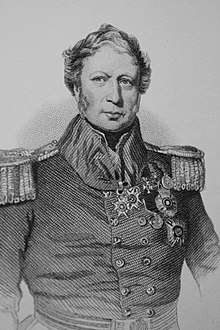James Macdonell (British Army officer)
General Sir James Macdonell or Macdonnell GCB KCH (1781 – 15 May 1857) was a Scottish officer of the British Army.

Life
He was the third son of Duncan Macdonnell, 14th clan chief of Clan MacDonnell of Glengarry and his wife, Marjory Grant, daughter of Sir Ludovic Grant.[1] Alexander Ranaldson Macdonell of Glengarry was his elder brother.
He was educated at a Roman Catholic school in Douai in France, as was then common with the Scottish aristocracy (Catholicism still at that time being illegal).[2]
He died in London on 15 May 1857.
Military career
He began as an ensign in 1793.
In 1794 (aged only 13), he was a lieutenant in the 78th (Highlanders) Regiment of Foot; in 1795, he was captain in the 17th Dragoons.
He joined the 19th Foot in 1796; he was major in the 78th Foot, and was awarded the Army Gold Medal for Maida in 1806. He joined the Coldstream Guards in 1811 as a lieutenant colonel, and served in the Peninsular War.[3]
He is best known for his command of the infantry defending the Hougoumont farmhouse at the Battle of Waterloo in 1815, where he fought with great distinction, including leading the vital closing of the gates, with his sergeant, James Graham. The farmhouse had around 1000 defending it against a French force of 2500. Macdonnell was wounded slightly in the battle.[4][5] The Duke of Wellington awarded him £1000 for his part in the battle calling him "the bravest man in the British Army". Macdonnell insisted on splitting this money with his sergeant, James Graham.[6][7]
In 1830 he was promoted to Major General and posted to Ireland where in 1837 he had to abate the troubles in Armagh.[8]
He commanded the Brigade of Guards in Lower Canada under Lord Durham from 1838 to 1841.
He returned to Britain in 1842 and was then successively given the colonelcy of the 79th Regiment of Foot (Cameron Highlanders) from 1842 to 1849 and the 71st (Highland) Regiment of Foot from 1849 until his death in 1857. He was promoted full general in 1854.
Awards
He was awarded Order of the Bath, Knight's Cross of Maria Theresa, and Royal Guelphic Order for his service at Waterloo. He was appointed KGB in 1855.
References
- http://www.biographi.ca/en/bio/macdonell_james_8E.html
- http://www.biographi.ca/en/bio/macdonell_james_8E.html
- Burke's landed gentry of Great Britain, Editor Peter Beauclerk Dewar, Burke's Peerage, 2001, ISBN 978-0-9711966-0-5
- "Armed Forces: Units: British Infantry: The Coldstream Guards". British Empire. Retrieved 11 August 2010.
- Ian R Gumm. "The Waterloo Campaign 1815 - Aftermath". Battlefield-tour.com. Archived from the original on 7 July 2011. Retrieved 11 August 2010.
- http://www.biographi.ca/en/bio/macdonell_james_8E.html
- https://www.bbc.co.uk/programmes/articles/nH3QsRz1dLyNLF1fYRtxVN/who-were-the-five-scots-heroes-at-waterloo
- http://www.biographi.ca/en/bio/macdonell_james_8E.html
Sources
- Julian Paget & Derek Saunders (1992); Hougoumont: The Key to Victory at Waterloo; Pen and Sword Books (paperback 2001) ISBN 0-85052-716-3
External links
| Wikisource has the text of the 1885–1900 Dictionary of National Biography's article about Macdonell, James (1841-1879). |
| Military offices | ||
|---|---|---|
| Preceded by Sir Thomas Arbuthnot |
Colonel of the 71st (Highland) Regiment of Foot 1849–1857 |
Succeeded by Sir Thomas Erskine Napier |
| Preceded by Hon. John Ramsay |
Colonel of the 79th Regiment of Foot (Cameron Highlanders) 1842–1849 |
Succeeded by James Hay |